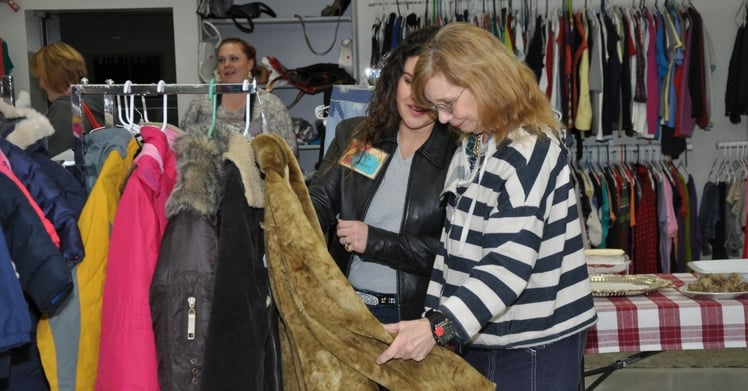Of Fads and Fundamentals
Dynamic libraries are meeting compelling needs with bold new services. Are these new services a fad, or are they fundamental to the future of libraries?

Last month's Library Journal highlighted a little library that could: the Fairmont Community Library Center, a branch of the Mississippi Valley Library District in Illinois. This dynamic branch has really stepped outside the traditional library box to address compelling needs in their community. They are impacting real lives by filling service gaps from preschool daycare to basic banking. Their obvious relevance in the community and the immediate positive outcomes of their work feel great. When we think about what they're doing as a model for the library of the future, though, we have to ask some tough questions about sustainability. Are non-traditional library services a fad, or are they fundamental to the future of libraries?
Let's acknowledge up front that any library not meeting basic and essential needs in their community will likely not survive. FCLC passes this test with honors. And any library that believes in meeting information needs primarily through printed materials is hiding from the fact that most of the world's information is simply not printed anymore. In that spirit, I'd like to explore the merits of a few intriguing new library service ideas and a few sustainability questions that accompany them.

Preschool Daycare
Clearly, there is a need for this in many underserved communities and, at first blush, it seems like a very natural extension of the 'storytime' or 'young readers' programs already common within public libraries. As libraries consider offering a consistent preschool daycare, however, they will need to count the cost of hiring and training staff that specialize in this area. Investing resources here means choosing not to offer some other services. Libraries that intend to offer preschool daycare need to ask, is this a service that can survive staff turnover? Is this the most important service the library can provide? Or, put another way, if the goal is to provide free preschool daycare for the whole community, is the library the best delivery mechanism for that service over the long term? How does the library offering compare to what schools, nonprofits, private providers, or other government entities might provide?

Banking
FCLC hosts a branch of a for-profit bank inside the library. Through its library-hosted branch, the bank provides basic financial services like checking and savings accounts and mortgages that were previously hard to come by within the community. The bank benefits from new customers it wouldn't otherwise have had and low overhead by sharing space with the library. The library, in turn, has received help with remodeling costs from the bank and will be able to share access to a new fiber optic Internet line installed by the bank. Over the long term, however, other libraries considering a similar program may encounter a few questions that are common to public-private partnerships. Could the library's fortunes become bound to the fortunes of the bank, for example? Public institutions (like libraries) usually favor public funding to shield themselves from the ups and downs of commercial entities. Could public funds be used to promote the bank or provide it with an unfair competitive advantage? Might the bank, by virtue of its proximity and initial largess, influence decisions about library staffing or services in ways that serve the bank's interests but not the interests of the community? More broadly, do banking services belong with the core mission of a library?

Social Services
Many libraries around the country have built close ties with providers of social services. This is especially evident in libraries that are actively working with homeless populations. Many libraries provide essential referral services linking the homeless to service providers. It's not uncommon for libraries to host some social services like health screening or even routine court hearings on premesis. A few libraries have even hired full time in-house social workers to serve vulnerable people more directly. Here again, though we have to ask ourselves, if the library becomes a conduit for social services, is a library the most effective delivery mechanism? If the library's reason for being is to provide social services for the most vulnerable populations, do we really need all that stuff that targets other audiences--research tools and genealogical archives for example?
The Core Mission of the Library
While it may seem a very stark way to frame the question, consider this: When budgets get cut sharply, what services go away? Does the book collection shrink or do the more recent services disappear?
The way that we answer the questions raised above depends on how we define the core mission of the library. I want to argue here as I've done before, that the core mission of the library is to provide tools and support for self-directed education. Self-directed means that the curriculum is infinitely flexible and that the support provided is highly adapted to local needs and preferences. This is the thing that libraries are uniquely positioned to provide. It's the thing libraries can do that no one else can. The tools and delivery mechanisms have changed in recent years (less print, more electronic), but self-directed education is the thing that libraries have always done.
Let's return to the question we began with: Are non-traditional services a fad or are they fundamental to the future of libraries? I'd argue that it depends on how they are implemented. I propose that any service that promotes self-directed education is fundamental to the library's mission. Any service that goes beyond self-directed education is likely more of a fad.
A library is well positioned to help a preschool teacher find the best curriculum resources and the most appropriate teaching methods. They may offer physical space for a school to operate, help find grants to fund it, or guidance on what would be required to start a small preschool business. When the library becomes a preschool, though, that service will eventually begin to displace services for adults and teens that a library can provide and a preschool can't.
The library can offer tutorials that help patrons understand banking services and facilitate access to them, but their relationship to any individual provider of banking services needs to be a very loose coupling.
A library can build awareness of available social services, help people learn how best to use them, and even facilitate the creation of new social services. In the end, though, the direct provision of social services is not what a library does best. You don't have to be a library to offer health screening or counseling, for example.
You DO have to be a library to offer free acces to subscription-based to online skills training, test preparation, and effective research tools. You DO have to be a library to curate the most locally relevant information on an unlimited range of topics, including banking and social services. These are the services where the value of libraries shines well into the future, because these are the fundamental things that no other public institution can do as well as the library can.
About the author: